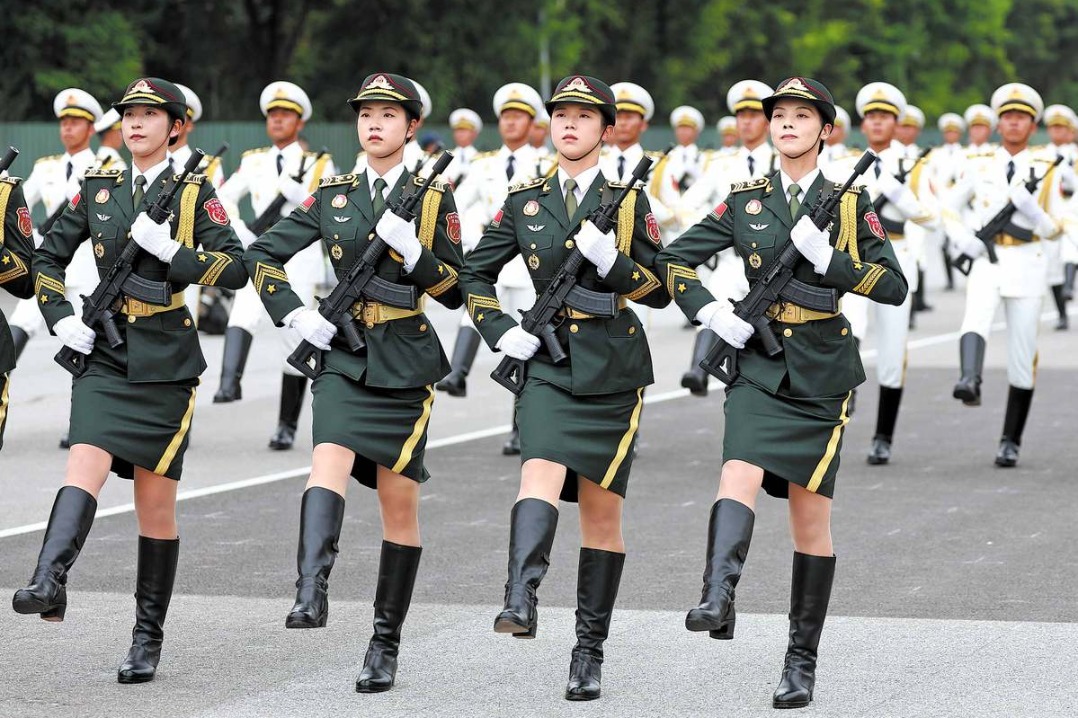Respecting and Protecting the Rights of All Ethnic Groups in Xinjiang

VI. Rights of Women and Children
Respect for women and protection of children are signs of social progress. Xinjiang attaches great importance to work related to women and children. It strives to solve the prominent problems they encounter, and promotes steady progress in the relevant undertakings. The legitimate rights and interests of women and children are effectively protected.
Emphasis is placed on improving the status of women. Xinjiang upholds the constitutional principle of equality between men and women and guarantees the right of women to participate in democratic decision-making, management and supervision of governance and social affairs.
The region attaches importance to the training and selection of female officials, and the number of women participating in the administration of public affairs has continued to grow, from 16,338 in early 1955 to 460,600 in 2019. In early 2020, there were 13 female deputies to the NPC (22.4 percent of Xinjiang's total), and 146 female deputies to the autonomous regional people's congress (27.2 percent). Among the members of the CPPCC National Committee living in Xinjiang, eight are women (23.5 percent).
Women are playing a growing role in grassroots democracy and business management. In 2020, women took 64.7 percent of the seats in urban residents committees, and 30.5 percent in villagers committees. Xinjiang guarantees women's equality in employment and their right to equal pay for equal work. The number of women in employment continues to expand. In 2019, 480,900 new urban jobs were created, of which 228,100 were taken up by women, accounting for 47.4 percent of the total. Women are now playing an important role in various fields, and their social and family status has improved notably.
Women's rights and interests are effectively protected. Xinjiang has implemented a health program available to all women in the region, and provided free screening for breast and cervical cancer. Women's health services and conditions have improved markedly. From 2000 to 2020, the rate of prenatal care increased from 80.1 percent to 98.5 percent, and the rate of hospital deliveries from 59.7 percent to 99.8 percent.
The local authorities in Xinjiang carry out family planning in accordance with the law. They provide quality and accessible reproductive health services, and it is up to individuals to decide whether or not to use contraceptives and how to use them. With economic and social development and higher living standards in Xinjiang, views on childbearing have changed significantly. Local people generally choose to marry later and have fewer and healthier children.
Xinjiang gives full play to the role of women's federations in safeguarding women's legitimate rights and interests. They listen to women's voices, reflect their concerns, give them support in their work and life, and help resolve women's rights issues. There is an active campaign to prevent and stop domestic violence against women. In 2020, Xinjiang formulated and enforced the Measures on Implementing the Anti-Domestic Violence Law. There are now 226 shelters for abused women and children in the region, which provide legal advice, psychological counseling and temporary social assistance to women who are unable to go home after suffering from domestic violence.
Children's rights and interests are effectively protected. Prioritizing children's wellbeing, Xinjiang has improved the services available to children at county, township and village levels, and fully guaranteed children's rights to subsistence and development. As a result, programs for children have made considerable progress.
Children's health care has improved remarkably. The infant mortality rate dropped from 23.5 per thousand in 2000 to 6.75 per thousand in 2020. Xinjiang has continued to implement a program to improve children's nutrition, providing free nutrition packages to rural children under school age, thus comprehensively improving children's health and nutrition. Vaccination coverage among children in Xinjiang remains at a high level, with over 90 percent coverage under the national immunization program, and the region's ability to prevent childhood diseases has been strengthened. In 2020, BCG vaccination coverage was 99.4 percent, polio (third dose) 99.6 percent, and DPT (third dose) 97.4 percent.
Xinjiang has established an assistance and protection mechanism for urban and rural children in need, including mandatory reporting, emergency response, assessment and assistance, and guardianship intervention. It has improved the system of assistance, management, family reunion, and resettlement for street children. Xinjiang has also fully implemented institutional care of orphans. The average monthly living allowance for orphans raised by child welfare institutions rose from RMB 900 per person in 2012(RMB 1,000 per person in the Xinjiang Production and Construction Corps, and RMB 900 per person in other parts of Xinjiang) to RMB 1,100 per person in 2020.
Xinjiang has strengthened the legal framework for protecting children and set up 73 legal aid stations for minors. It ensures that children with disabilities receive compulsory education in regular schools or special education schools, or are taught by teachers in their homes. At the end of 2020, there were 28,000 children with disabilities studying at compulsory education institutions, with a gross enrollment rate of 98.5 percent. The region has 32 special education schools with 5,000 students. There are now 165 rehabilitation centers for children with disabilities. A total of 2,850 children received rehabilitation assistance in 2020.
VII. Freedom of Religious Belief
Respect for and protection of freedom of religious belief is a basic and long-term national policy of the Chinese government. Subject to the principles of protecting lawful practices, proscribing illegal activities, containing extremism, resisting infiltration, and punishing crime, the local government of Xinjiang fully applies the policy, protecting legitimate religious activities and ensuring the public's freedom of religious belief in accordance with the law.
Freedom of religious belief is guaranteed by law. This freedom is a basic right of citizens. The Constitution stipulates that citizens of the People's Republic of China shall enjoy freedom of religious belief, and that the state shall protect normal religious activities. In Xinjiang, people have the freedom to believe in or not believe in any religion, to believe in one religion in preference to another, to believe in any sect of the same religion, to abandon their past beliefs, and to become believers at their chosen time.
No organization or individual may compel citizens to believe in or not believe in any religion; nor may they discriminate against citizens who believe in or do not believe in any religion. Anyone who infringes upon the freedom of religious belief will be held legally liable. No citizen may suffer discrimination or unfair treatment for practicing or not practicing any religion.
Lawful religious practices are protected. There are many religions in Xinjiang, including Islam, Buddhism, Taoism, and Protestant, Catholic and Eastern Orthodox Christianity. Religious activities such as attending religious services, worshipping Buddha, attending Mass, praying, and reciting scriptures are managed by religious groups and the believers themselves. Such activities are protected by law, and no organization or individual may interfere with them.
The China Islamic Association makes arrangements every year for practicing Muslims to go on pilgrimage to Mecca in Saudi Arabia. It funds medical care and interpretation for pilgrims, and offers other services to ensure safe and orderly travel.


































